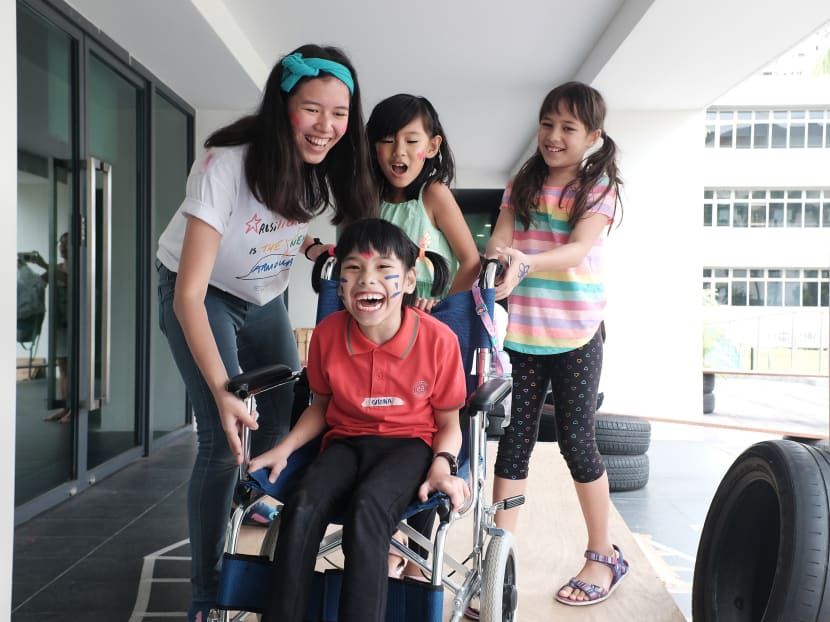At arts camp, children learn to empathise with peers who have special needs
SINGAPORE — When her newfound friend Qistina Cheong, nine, who has cerebral palsy, wanted to play on a wheelchair-friendly see-saw, eight-year-old Joy Sexton eagerly helped to push her wheelchair.

When her new-found friend Qistina Cheong, 9, who has cerebral palsy (centre), wanted to play on a wheelchair-friendly see-saw, 8-year-old Joy Sexton (rightmost) raced to help her bubbly friend with pushing her wheelchair. The two had become fast friends after Superhero We three-day inclusive arts camp, for 31 children with and without disabilities which ended on Wednesday (Mar 14). Photo: Toh Ee Ming/TODAY
SINGAPORE — When her newfound friend Qistina Cheong, nine, who has cerebral palsy, wanted to play on a wheelchair-friendly see-saw, eight-year-old Joy Sexton eagerly helped to push her wheelchair.
The two had become fast friends after a three-day arts camp that saw 31 children with and without disabilities taking part.
Opened to children aged six to 10, the camp was organised for the first time by ground-up inclusive arts movement Superhero Me, and was held during the school term break this week at Enabling Village, a community space in Lengkok Bahru near Redhill that caters to persons with disabilities.
Of the 31 children there, 13 had conditions such as autism, cerebral palsy, intellectual disability and global developmental delay.
During the camp, which ended on Wednesday (March 14), the children learnt about empathy and tried to get a better understanding of each other’s differences through activities and games specially designed for them. For instance, all the children had to get on the floor, including those in wheelchairs, and draw an outline of each other’s bodies.
There was also a “role reversal” game, where abled children were blindfolded and their peers with special needs took the lead to get through an obstacle course together. Superhero Me co-founder Jean Loo, 34, said that this helps those with special needs to show that they “do not need to be the ones being helped all the time”.
The special needs children, who attended the camp for free, were identified by Superhero Me’s partners — namely special education centres Awwa School, Pathlight School, Cerebral Palsy Alliance Singapore School and Rainbow Centre. The rest of the children paid S$50.
Supporting the event were philanthropic organisation Lien Foundation, the Enabling Village and the TODAY Enable Fund.
In a 2016 survey on inclusive attitudes, the Lien Foundation found that only three in 10 respondents agree that Singapore is an inclusive society, with the key reason being a lack of opportunities for social interaction.
The results also showed that only one in 10 Singaporeans are confident of interacting with children with special needs, while one in four parents of children with no development conditions said that their child has friends with special needs.
Ms Loo noted that children with special needs often mix with others with similar disabilities as well, and the camp was thus an ideal avenue for children from various backgrounds to interact and make friends.
It was targeted at lower primary children because, at that age, they “are more aware” of their sense of self and “attitudes can still be shaped”, she explained.
SHOWING SENSITIVITY TO OTHERS’ NEEDS
However, organising the camp was not an easy undertaking. It took two months of planning, and the help of some 20 trained facilitators from diverse backgrounds, including students, a psychologist, an architect, a lawyer-turned-author, a vice-principal from a special education school, and youth with special needs.
They had to be mindful that not all the attention was given to children with special needs, and the programme was also not “dumbed down” to the typically developing children.
“There’s a lot of on-the-spot thinking. You need to read the energy in the group quite fast and show sensitivity to their needs,” Ms Loo said, adding that they plan to organise such camps more regularly, and the next one could be at the end of May or early June.
One parent and fulltime caregiver, Mr Kenneth Mah, 48, said that such a camp is a good first step in encouraging children to be more accepting of others who are different from them. His nine-year-old daughter Chloe, who has Pompe disease — a rare genetic condition that causes progressive muscle weakness — communicates with others through an iPad.
When the children were stumped in an activity about the solar system, Chloe indicated the names of the planets on her iPad, and “all the children crowded around her”, he said.
“Chloe has medical equipment (around her), so the other kids got curious, they started to ask, and you get to explain to them… It’s a good start that they learn about inclusiveness when they are young,” Mr Mah said, adding that parents should also learn not to “pull away” their children from those with special needs.
For social work educator Chia Chin Chin, 47, the camp gave her two children, aged eight and six, a chance to interact closely with children with disabilities for the first time. She observed that her eight-year-old daughter “learnt to slow down” to accommodate the needs of a child with limited mobility, while holding her hand.
“They might not be very comfortable reaching out yet… But they understand the differences some children may have that make them stand out from others”, she said. Madam Chia hopes that mainstream schools would also look into having such camps in future.






